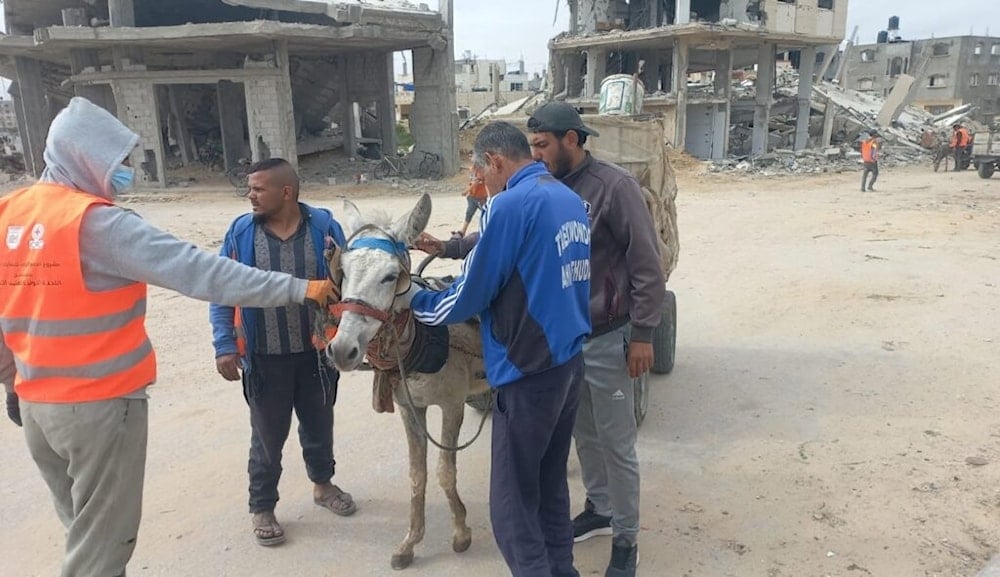Vets rushing to save Gaza's donkeys; but why?
A Guardian report details how, after surviving an Israeli airstrike that destroyed their mobile veterinary clinic, Dr. Saif Alden and his team in Gaza continue treating donkeys — now vital lifelines for Palestinians amid war and blockade.
-

The Safe Haven for Donkeys team continue their work in the Gaza Strip on April 3, 2025. (Safe Haven for Donkeys)
A report by The Guardian on Tuesday quotes Dr. Saif Alden, who narrated the moment the veterinary clinic he worked at was hit by an Israeli airstrike, an attack he described as feeling like an "earthquake from the sky." The report details that Alden and his team survived, but the strike destroyed all the equipment and medicine needed for the clinic to function.
Despite the devastation, the team behind the mobile animal clinic, run by the charity Safe Havens for Donkeys, saw the incident as a setback rather than a defeat, according to the report.
Read next: UNRWA warns of humanitarian disaster in Gaza amid Israeli blockade
“It was a test of our purpose, our mission, and our resilience,” says Alden. “It was a miracle that we survived. And survival wasn’t the end of the story – it was just the beginning of another struggle. The attack took from us all the tools we use to save lives.
“We’ve started again, from zero, because the animals are still here. They still need us. And we will never abandon them.”
The report stated that since the start of the war on Gaza in October 2023, Alden’s mobile clinic has treated more than 7,000 donkeys, as well as thousands of other animals. In a region where Israeli bombardment has decimated roads, destroyed infrastructure, and made fuel nearly impossible to access due to the ongoing blockade, donkeys have become indispensable.
Why are donkeys so important?
With vehicles scarce and many areas inaccessible, donkeys now serve as lifelines for countless Palestinians, transporting goods, water, the sick and injured, and even entire families fleeing from one zone to another under Israeli evacuation orders.
“These donkeys are the last thread connecting people to the basic services they desperately need,” says Alden.
“We’ve seen donkeys in Gaza who’ve saved lives – transporting pregnant women to hospitals to give birth, carrying the injured to safety, standing by the side of those who have lost everything, offering warmth when all else is cold. They give without asking for anything in return.”
Read next: Gaza aid nearly gone as 'Israel' blockade deepens: UNRWA
The report mentioned that Alden’s team has continued working, overcoming not only the airstrike but also frequent close calls, destroyed roads, and a constant struggle to find food and shelter.
It is worth mentioning that the clinic travels throughout Gaza, setting up in different neighborhoods on scheduled days so residents can bring injured animals for care. But the work goes beyond appointments. The team searches through the rubble to find abandoned animals, responds to emergency calls from owners, and even enters dangerous areas to rescue those still trapped or wounded.
“When we help them, we are not simply saving a life; we are preserving a sacred bond between humans and animals. We are keeping hope alive.”

 3 Min Read
3 Min Read








